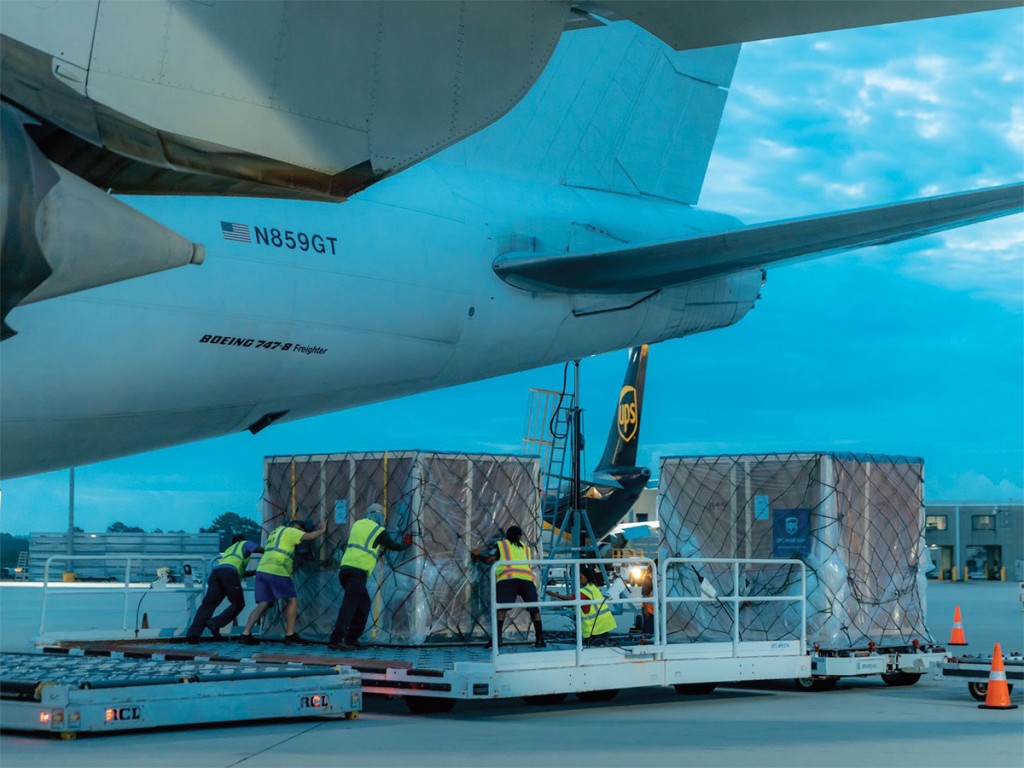With the COVID-19 pandemic came a surge in demand and South Carolina-based Nephron Pharmaceutical suddenly needed a new logistics plan.

For most of its 32 years, Nephron Pharmaceutical Corporation of West Columbia, South Carolina, manufactured respiratory inhalant medicines and shipped them to US hospitals on FedEx pallets. Business was solid.
In 2017 the company started focusing on the Federal Drug Administration’s (FDA) 503 B ‘known shortage list’ which is where hospitals and surgical centers request sterile injectable medicines they desperately need and cannot quickly get from other manufacturers.
“The first year in that business, we only had $5,000 in annual sales from that start up division,” Ms. Lou Wood Kennedy, chief executive officer and owner of the privately-held Nephron, told the American Journal of Transportation.

The COVID Boom
“Then the COVID-19 pandemic hit, and sales exploded. Suddenly, we had tremendous demand from some 3,000 US hospitals who had shortages of sterile injectables and were delaying surgeries,” she said.
Immediately, the certified woman-owned pharmaceutical company had another big problem. While they could ramp up sterile compounding product production, the logistics and distribution of the largely temperature-controlled medication was a huge problem.
“For 20 years, we were a FedEx shop, shipping pallets by truckloads,” said Kennedy. “But I was now very concerned about how we can handle a large volume of small packages. It’s an entirely different world.”
For example, when Nephron shipped pallet loads of its medicines, the freight often went to a warehouse or a distribution center for breakdown and sub-distribution purposes. As part of the FDAs 503 B program, the US government requires participants to send the product direct to the licensed recipient—a hospital or a surgery center.
Ironically, a friend of Kennedy’s who had retired from UPS after 40-plus years of service, suggested that Nephron talk to the worldwide delivery company because it not only specialized in small package and expedited shipment but because it also had a separate healthcare logistics division experienced in air and ground shipping of medicines among other health-related products. Said Kennedy: “After conversations with their people, I really felt UPS understood small package movement by ground.”
Kennedy moved Nephron’s logistics and shipping to UPS Healthcare division in Atlanta in 2018. Ryan McLaurin, senior account manager in charge of the program, told the American Journal of Transportation, “Some of the early challenges were around packaging. They were selling intravenous bags and bottles which started leaking and we re-engineered them to make sure the medicine arrived safely and intact at the hospitals.”
“UPS sent their engineering experts who made adjustments to our layout and shipping areas,” noted Kennedy. “Their suggestions and rearrangements amped up our ability to handle logistics in a much more efficient way.” McLaurin said UPS revamped the shipping area a total of four times.

A Pharmaceutical Logistics Plan
Added Kennedy: “UPS Healthcare worked with Nephron to create a pharmaceutical logistics plan and custom cold chain packaging materials to protect the critical temperature-sensitive shipment. We were provided with speedy delivery distribution with full visibility along the way.”
Part of that plan, said McLaurin, was helping Nephron reduce the size of their small packaging which made it lighter and less expensive. “We actually shrunk their package for the sterile injectables by 15%.”
Meantime, UPS zeroed in on logistical and handling problems. “The challenge Nephron had was limited floor space in their shipping area but high ceilings, so we introduced them to a German vertical lift module manufacturer called Kardex which makes it easier for the pickers to pack small parcels,” said McLaurin. “Nephron has amazing state-of-the-art manufacturing themselves with complete robotics, but everything was set up for pallet shipping. We recommended they purchase two modules, but they ended up buying 10.”
In addition, he said Kardex set up a distribution facility in West Columbia near the Nephron Pharmaceutical headquarters.
Kennedy said UPS designed a major logistics solution for Nephron line of Nitrile gloves. The division found a manufacturer in South Korea, but Korean Air Lines does not have a station in South Carolina and chose, instead, to fly the glove manufacturing equipment to Chicago O’Hare and truck them to Nephron’s headquarters.
“But time is of the essence in healthcare,” said McLaurin, “and we chartered two Atlas Air 747-8 freighters and landed them at Columbia’s Metropolitan Airport which had never handled a jumbo 747 although it has one of the longest runways in the Southeast.” Added Kennedy: “UPS unloaded that entire plane in 45 minutes after landing and it was on its way. UPS is like a well-oiled machine.”
The pharmaceutical CEO claims her company has a “great partnership” with the global freight hauler. “How do you top this? UPS allows us to ship overnight packages to our customers free of charge to the recipient in the US and that includes Hawaii and Alaska.”
Overall, McLaurin contends the relationship between UPS and Nephron is more than shipping. “It’s like a business consultancy. They made a lot of changes, and it was during the pandemic when other companies were having troubles.”
Indeed, in the last four years when Nephron launched its 503 B division, it recently generated $11 million in sales.





